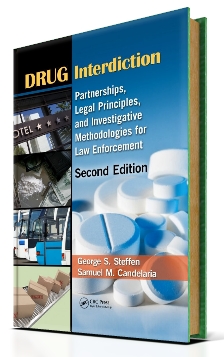Drug Interdiction
Second Edition
Partnerships, Legal Principles, and Investigative Methodologies for Law Enforcement
The challenge before us is great, and law enforcements’ responsibility is best achieved with established and effective enforcement practices, within the confines of the law. Best practices in drug interdiction should be paramount. Creativity, vision, skill, integrity, values, and adaptability are core principles in drug enforcement.
A successful investigation depends on the interdiction investigators’ ability to work in a variety of environments. This book provides that step-by-step guide. In order for law enforcement to be effective and best suited for the extreme challenge that drug enforcement brings, they must have the resources, knowledge, and appropriate training.
The second edition of this book continues the tradition begun by George S. Steffen and Samuel M. Candelaria in providing the most comprehensive text available, providing a full range of information for drug enforcement officers. This is real world information, for real world investigations—nothing is better.
The second edition of the book continues to break from traditional criminal investigation texts in a number of ways. It provides a simple, but comprehensive examination of established investigation methods in the areas of domestic drug interdiction and consensual encounters for law enforcement officers and investigators.
The way we approach the material in the book is from a “cop’s point of view.” A significant quantity of the information presented to the reader is directly related to the authors’ experiences in the field, grounded in case law and in the courtroom setting, where the nuances of domestic drug interdiction are learned and failed.
There are several principal themes in the book that are emphasized throughout. The central theme is the importance of safety. The safety of the officer is critical in all interdiction environments. Emphasis should be placed on training, proper preparation, and planning.
The investigators should conduct themselves properly and within the confines of the law. We urge law enforcement officers participating in domestic drug investigations to be professional and conduct themselves appropriately. We stress throughout, that the foundation for our work is deeply rooted in case law, whether federal or state. Particular attention is given to this because we do not want to create an environment in which we lose the benefits the courts have afforded us in combating the illicit drug trade.

SNIPPET FROM OUR BOOK
Let us break down the words consensual encounter and define them. Consensual means existing or made by mutual consent without intervention or any act of writing. Encounter means to come face to face.
You as a police officer can approach and speak with people anywhere, anytime you choose as long as you have a legal right to be there. You might think to yourself, “I’m a police officer; I can go to any location or contact anyone I want, because I’m a law enforcement officer.”
In a consensual encounter setting, the Supreme Court of the United States protects and supports you in this situation. Supreme Court case law also defines for you what circumstances must be present and as a law enforcement officer, you must ensure the persons you are contacting or approaching that those factors are present.
The courts will scrutinize your every action, from the minute you approach or contact a person to the last second of contact until you terminate the encounter, or until you make a seizure or arrest. Having the legal right to be at a certain location in a consensual encounter will be a very important factor in the court determining whether or not the encounter was voluntary and lawful.
Was the law enforcement officer there lawfully? These are questions you must define before making the encounter, for surely the courts will define it for you and it could be a determining factor in your case.
Reviews
"The book is a broad insight into criminal interdiction and offers an easy to read reference for law enforcement managers who are looking to introduce interdiction programs."
